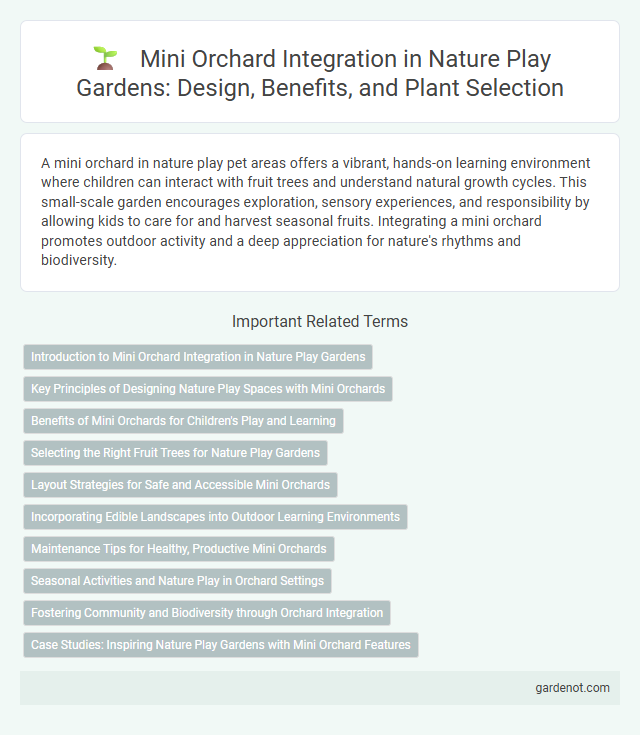A mini orchard in nature play pet areas offers a vibrant, hands-on learning environment where children can interact with fruit trees and understand natural growth cycles. This small-scale garden encourages exploration, sensory experiences, and responsibility by allowing kids to care for and harvest seasonal fruits. Integrating a mini orchard promotes outdoor activity and a deep appreciation for nature's rhythms and biodiversity.
Introduction to Mini Orchard Integration in Nature Play Gardens
Mini orchard integration in nature play gardens enhances biodiversity and promotes hands-on learning about fruit tree life cycles and ecosystems. Incorporating dwarf fruit trees and companion plants creates a dynamic environment encouraging sensory exploration, seasonal observation, and wildlife habitat development. Strategic placement of mini orchards supports sustainable gardening practices while fostering environmental stewardship among children.
Key Principles of Designing Nature Play Spaces with Mini Orchards
In designing nature play spaces with mini orchards, prioritize biodiversity by selecting a variety of native fruit trees that support local wildlife and seasonal changes. Incorporate multi-sensory features such as tactile bark, fragrant blossoms, and edible fruits to enhance children's engagement and learning experiences. Ensure safety and accessibility through natural barriers and clear pathways while maintaining an organic, unstructured layout that encourages exploration and imaginative play.
Benefits of Mini Orchards for Children's Play and Learning
Mini orchards provide a rich sensory environment that enhances children's cognitive development through hands-on interaction with nature. Exposure to diverse plant species improves observational skills, encourages responsibility, and fosters environmental stewardship. Integrating mini orchards in play areas supports physical activity while teaching valuable lessons about biology, ecology, and nutrition.
Selecting the Right Fruit Trees for Nature Play Gardens
Choosing the right fruit trees for a mini orchard in nature play gardens involves prioritizing species that are non-toxic, low-maintenance, and resilient to local climate conditions. Varieties such as dwarf apple, cherry, and pear trees provide safe, edible fruit that encourages hands-on learning and sensory exploration for children. Incorporating native or heritage fruit tree species supports biodiversity and enhances the ecological health of the garden ecosystem.
Layout Strategies for Safe and Accessible Mini Orchards
Strategic layout design of mini orchards enhances safety and accessibility by incorporating clear pathways with non-slip surfaces and adequate spacing between fruit trees to prevent overcrowding. Elevated planting beds and raised platforms improve visibility and ease of harvesting while minimizing trip hazards for children and elderly visitors. Incorporating varied tree heights and sensory elements like textured bark and aromatic flowers creates an engaging, inclusive environment that supports educational nature play.
Incorporating Edible Landscapes into Outdoor Learning Environments
Mini orchards create dynamic outdoor learning environments by integrating edible landscapes that engage children in hands-on exploration of fruit-bearing trees and plants. These spaces enhance sensory experiences, foster environmental stewardship, and provide opportunities for teaching biology, nutrition, and sustainability through direct interaction with nature. Incorporating diverse, easy-to-maintain fruit varieties optimizes year-round learning and promotes healthy eating habits among students.
Maintenance Tips for Healthy, Productive Mini Orchards
Pruning mini orchard trees during late winter enhances air circulation and sunlight exposure, promoting robust growth and higher fruit yields. Regularly inspecting for pests and diseases allows early intervention, preventing extensive damage and ensuring healthy trees. Implementing consistent watering schedules and applying organic mulch conserves soil moisture, supports root development, and improves overall orchard productivity.
Seasonal Activities and Nature Play in Orchard Settings
Mini orchards offer dynamic seasonal activities that engage children in nature play, fostering hands-on learning through planting, pruning, and harvesting fruit. These interactive experiences enhance sensory exploration and ecological awareness as kids observe pollinators, fruit development, and natural cycles in orchard settings. Incorporating themed games and storytelling within the mini orchard further promotes environmental stewardship and physical activity throughout the year.
Fostering Community and Biodiversity through Orchard Integration
Mini orchards serve as vital green spaces that enhance local biodiversity by attracting pollinators and supporting native wildlife. Integrating these orchards into community areas promotes social cohesion, encouraging residents to engage in shared stewardship and educational activities. Through collaborative care, mini orchards grow into vibrant hubs that connect people and nature, fostering a sustainable environment.
Case Studies: Inspiring Nature Play Gardens with Mini Orchard Features
Mini orchards in nature play gardens enhance children's sensory experiences by integrating edible fruit trees like apple, pear, and cherry varieties. Case studies reveal that these gardens stimulate curiosity, promote outdoor learning, and encourage sustainable play by connecting kids with seasonal growth cycles and biodiversity. Incorporating mini orchard features supports environmental education and fosters stewardship through hands-on interaction with nature.
Mini orchard Infographic

 gardenot.com
gardenot.com